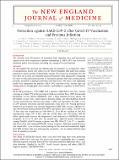Protection against SARS-CoV-2 after Covid-19 vaccination and previous infection
Abstract
Background: The duration and effectiveness of immunity from infection with and vaccination against severe acute respiratory syndrome coronavirus 2 (SARS-CoV-2) are relevant to pandemic policy interventions, including the timing of vaccine boosters. Methods: We investigated the duration and effectiveness of immunity in a prospective cohort of asymptomatic health care workers in the United Kingdom who underwent routine polymerase-chain-reaction (PCR) testing. Vaccine effectiveness (≤10 months after the first dose of vaccine) and infection-acquired immunity were assessed by comparing the time to PCR-confirmed infection in vaccinated persons with that in unvaccinated persons, stratified according to previous infection status. We used a Cox regression model with adjustment for previous SARS-CoV-2 infection status, vaccine type and dosing interval, demographic characteristics, and workplace exposure to SARS-CoV-2. Results: Of 35,768 participants, 27% (9488) had a previous SARS-CoV-2 infection. Vaccine coverage was high: 95% of the participants had received two doses (78% had received BNT162b2 vaccine [Pfizer-BioNTech] with a long interval between doses, 9% BNT162b2 vaccine with a short interval between doses, and 8% ChAdOx1 nCoV-19 vaccine [AstraZeneca]). Between December 7, 2020, and September 21, 2021, a total of 2747 primary infections and 210 reinfections were observed. Among previously uninfected participants who received long-interval BNT162b2 vaccine, adjusted vaccine effectiveness decreased from 85% (95% confidence interval [CI], 72 to 92) 14 to 73 days after the second dose to 51% (95% CI, 22 to 69) at a median of 201 days (interquartile range, 197 to 205) after the second dose; this effectiveness did not differ significantly between the long-interval and short-interval BNT162b2 vaccine recipients. At 14 to 73 days after the second dose, adjusted vaccine effectiveness among ChAdOx1 nCoV-19 vaccine recipients was 58% (95% CI, 23 to 77) - considerably lower than that among BNT162b2 vaccine recipients. Infection-acquired immunity waned after 1 year in unvaccinated participants but remained consistently higher than 90% in those who were subsequently vaccinated, even in persons infected more than 18 months previously. Conclusions: Two doses of BNT162b2 vaccine were associated with high short-term protection against SARS-CoV-2 infection; this protection waned considerably after 6 months. Infection-acquired immunity boosted with vaccination remained high more than 1 year after infection.
Citation
SIREN Study Group & Dhasmana , D J 2022 , ' Protection against SARS-CoV-2 after Covid-19 vaccination and previous infection ' , New England Journal of Medicine , vol. 386 , no. 13 , pp. 1207-1220 . https://doi.org/10.1056/NEJMoa2118691
Publication
New England Journal of Medicine
Status
Peer reviewed
ISSN
0028-4793Type
Journal article
Description
Supported by the U.K. Health Security Agency, the U.K. Department of Health and Social Care (with contributions from the governments in Northern Ireland, Wales, and Scotland), the National Institute for Health Research, and grants from the Medical Research Council.Collections
Items in the St Andrews Research Repository are protected by copyright, with all rights reserved, unless otherwise indicated.
Related items
Showing items related by title, author, creator and subject.
-
"I'll wait for the English one" : COVID-19 vaccine country of origin, national identity, and their effects on vaccine perceptions and uptake willingness
Atkinson, Mark; Ntontis, Evangelos; Neville, Fergus G.; Reicher, Stephen D. (2023-10-01) - Journal articleVaccines can play a crucial role in reducing the negative outcomes of pandemics. In this paper we explore how vaccine perceptions and uptake willingness can be affected by vaccine-related information, the vaccine’s country ... -
COVID-19 vaccination in pregnancy : the impact of multimorbidity and smoking status on vaccine hesitancy, a cohort study of 25,111 women in Wales, uk
Mhereeg, Mohamed; Jones, Hope; Kennedy, Jonathan; Seaborne, Mike; Parker, Michael; Kennedy, Natasha; Akbari, Ashley; Zuccolo, Luisa; Azcoaga-Lorenzo, Amaya; Davies, Alisha; Nirantharakumar, Krishnarajah; Brophy, Sinead (2023-09-11) - Journal articleBackground Multimorbidity, smoking status, and pregnancy are identified as three risk factors associated with more severe outcomes following a SARS-CoV-2 infection, thus vaccination uptake is crucial for pregnant women ... -
The potential impact of vaccine passports on inclination to accept COVID-19 vaccinations in the United Kingdom : evidence from a large cross-sectional survey and modeling study
de Figueiredo, Alexandre; Larson, Heidi J.; Reicher, Stephen D. (2021-10) - Journal articleBackground The UK Government is considering the introduction of vaccine passports for domestic use and to facilitate international travel for UK residents. Although vaccine incentivisation has been cited as a motivating ...

